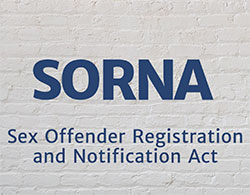Motions to Terminate or Reduce Federal Sex Offender Registration

UNDER SORNA BASED ON 34 U.S.C. § 20915
Terminate or Reduce Federal Sex Offender Registration
Federal sex crime related convictions, including possession of child pornography, that require sex offender registration under the Sex Offender Registration and Notification Act (SORNA) trigger both federal registration periods and state registration periods. The federal sex offender registration is not usually for a lifetime; however, the state in which you live may require a longer length of registration. Therefore, federal registrants must first file a motion to terminate or reduce the federal sex offender registration requirement in federal court and then file a petition or motion in the state in which you live to terminate or reduce your state sex offender registration. The Khojayan Firm can prepare and file both motions.
As to federal sex offender registration, pursuant to section 20915:
(a) Duration. A sex offender has a continuing obligation to register and keep the registration current (except when the sex offender is in custody or civilly committed) for the following periods of time:
(1) 15 years, if the offender is a tier I sex offender;
(2) 25 years, if the offender is a tier II sex offender; and
(3) The life of the offender, if the offender is a tier III sex offender.
(b) Commencement. The registration period begins to run—
(1) When a sex offender is released from imprisonment following conviction for the offense giving rise to the registration requirement, including in cases in which the term of imprisonment is based wholly or in part on the sex offender’s conviction for another offense; or
(2) If the sex offender is not sentenced to imprisonment, when the sex offender is sentenced for the offense giving rise to the registration requirement.
(c) Reduction. If a tier I sex offender has maintained for 10 years a clean record, as described in 34 U.S.C. 20915(b)(1), the period for which the sex offender must register and keep the registration current under paragraph (a) of this section is reduced by 5 years. If a tier III sex offender required to register on the basis of a juvenile delinquency adjudication has maintained a clean record, as described in 34 U.S.C. 20915(b)(1), for 25 years, the period for which the sex offender must register and keep the registration current under paragraph (a) of this section is reduced to the period for which the clean record has been maintained.
First, attorney Shaun Khojayan will correspond with the appropriate Department of Justice, probation officer, and your registering agency to determine your “tier.” Then the motion will point out to the court that you have maintained a “clean record.” The “clean record” conditions are that the sex offender not be convicted of any felony or any sex offense, successfully complete any period of supervision, and successfully complete an appropriate sex offender treatment program (certified by a registration jurisdiction or the Attorney General). If successful, the SORNA registration period would then be reduced by five years for a tier I sex offender who maintains a clean record for 10 years, and reduced to the period for which the clean record is maintained for a tier III sex offender required to register on the basis of a juvenile delinquency adjudication who maintains a clean record for 25 years. See 34 U.S.C. 20915(a), (b).
In addition, we can explore and file applications to request an exclusion from being on the Internet Sex Offender Registry (Megan’s Law). Exclusions are based on the type and facts of the crime you were convicted of. If the Department of Justice disagrees with our application, we can appeal the decision administratively and then to the court. We will always fight for you and your rights.


